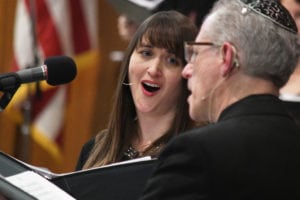
Jennifer Diamond and Cantor David Lipp perform together during the 2018 Adath Jeshurun Music Festival. This year’s festival celebrated the 25th anniversary of Louisville’s Voces Novae choral group. (Community photo by William Beasley)
One by one, black-clad singers of the Voces Novae choral group walked into the sanctuary, took their places on the pulpit, stood silent for a moment or two, then, at the conductor’s urging, grew their voices into a stirring Renaissance-Baroque chant of Psalm 100 – in Hebrew.
Not the kind of music one normally hears in a synagogue. But this piece was composed by Salomone Rossi (1570-1628), a Jewish Renaissance-era composer who wrote for Christians and Jews in the city of Mantua.
The piece struck the note for the 2018 Adath Jeshurun Music Festival, Sunday, March 11. This year’s performance celebrated the 25th anniversary of Voces Novae, which is Latin for “New Voices.” More than 375 concertgoers were in the seats.
It was choral music – old and new – performed as many people have probably never heard it. While all the selections were Jewish themed, some were recently composed. Others were so old that no one knows who wrote them.
For Voces Novae Artistic Director Frank A. Heller III, the festival marked a long-overdue return to AJ. It was six years ago when his group last performed there.
“We are so grateful to be here,” Heller told the audience, “and we are so thrilled to share this beautiful place with all these beautiful people. Enjoy. That’s all we ask, to enjoy your rich heritage tonight.”
For some selections, Voces Novae shared the pulpit with the Community Choir. Cantors David Lipp and Sharon Hordes, and vocalist Jennifer Diamond performed as a trio and each soloed.
Though the group opened with a Renaissance-era piece, the rest of the show demonstrated that choral music is at home in any age, influenced by practically any genre of music.
They sang “Birth is a Beginning,” a piece that the composer, Marshall Portnoy, was commissioned to write for Cantor Lipp’s 10th anniversary at AJ. “Ein Keloheinu” by Zina Goldrich had a musical theater style to it.
“Audio Kerida,” a Ladino composition by Michael Isaacson, based on La Traviata by Giuseppe Verdi, was distinctly feminine in performance, accompanied by flautist Margaret Foote Jamner and sung by the trio of Hordes, Diamond and vocalist Julie Nichelson.
“Kiddush,” composed by early 20th century songwriter Kurt Weil, the creator of The Threepenny Opera, was a jazz- blues fusion in the same vein as George Gershwin’s “Rhapsody in Blue.”
But at no time was the evening more alive than when Lipp, slowly playing acoustic guitar, strolled down the middle aisle singing Debbie Friedman’s standard, “Mi Shebeirach.” As he reached the pulpit, the final notes of the song of healing – a standard in synagogues everywhere – leaving his lips, the choir chimed in for another chorus. Then Heller turned to the audience, urging them to sing, too. For “Shalom Rav,” by Danny Freelander and Jeffrey Klepper, Heller again asked the crowd to join in.
Organized in 1993, Voces Novae is a semi-professional choral ensemble. Composed of 50-60 auditioned singers of all ages and backgrounds, the group has partnered with composers Andrew Maxfield and Harry Pickens to celebrate the poetry of Kentucky native Wendell Berry. It also has collaborated with the Louisville Orchestra for Beethoven’s Ninth Symphony.
Comparing the night’s singing to the Jewish concept of hiddur mitzvah (beautification of commandments), Lipp, organizer of the festival, said the idea is that mitzvoth such as davening in a synagogue or singing liturgy should be done “with the most exquisite beauty we can muster.”
Voces Novae succeeded.



I am so sorry that I had to miss singing with all of you!